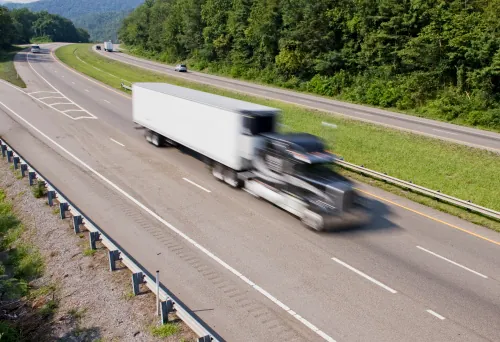Raleigh, NC: (919) 277-9299

South Carolina trucking laws and federal regulations enforce rules to maintain safe roadways, but truckers often ignore these and put the public at risk. Despite penalties and accidents, freight companies frequently skirt the laws to complete more routes in less time. That’s why Bell Legal Group’s trucking accident lawyers look for operator infractions, repair and inspection failures, and safety violations when determining the cause of a crash.
Various agencies govern commercial drivers, making it difficult for anyone unfamiliar with this industry to know where or how to investigate accident liability. Instead of trusting the trucking company to divulge misconduct or accepting their insurance adjuster’s explanation, we suggest meeting with an attorney to walk through the truck accident evidence and discover where the negligence occurred.
South Carolina Trucking Laws That Improve Safety
The South Carolina Department of Transportation (SCDOT) mandates driver and vehicle regulations to ensure both are road-ready and safe. Trucking companies in South Carolina need to follow state-specific laws for licensing and vehicle maintenance, and keep records of each. Failing to do so can result in accidents and injuries to other drivers. Here’s how violating SCDOT regulations leads to accidents:
Driver Eligibility
An untrained, unqualified driver puts everyone on the roadways at risk. Operators of commercial vehicles must possess a valid license and pass a physical DOT exam. This combination of requirements ensures that the driver has the knowledge and skill to operate the vehicle and will not be impaired by physical limitations or health conditions.
Vehicle Inspections
Drivers must complete pre- and post-trip vehicle safety inspections and report any deficiencies to superiors. These checks verify that vehicle accessories are in good working order and do not pose safety risks. The driver should inspect tire treads, headlights, flashers, and the horn and reverse signals, and ensure emergency equipment is available.
Mechanical issues that cause 18-wheeler or box truck crashes are often detectable during the pre- and post-trip inspections required by South Carolina law. When a neglected leaky tire or faulty brake light causes an accident, the driver, freight company, or both can be liable. Bell Legal Group attorneys can evaluate logbooks and other evidence to determine whether a breach of South Carolina’s vehicle inspection laws contributed to a truck accident.
Federal Regulations That Promote Safe Trucking Operations
The mission of the Federal Motor Carrier Safety Administration (FMCSA), a separate administration within the US DOT, is to reduce crashes and injuries involving large vehicles and carriers. All truck drivers with a Commercial Driver’s License (CDL) must follow the FMCSA laws, whether they are operating in South Carolina or completing a cross-country haul. The following are some of the areas an attorney will look into after a trucking crash.
Operator Testing and Licensing
Each state designs its own knowledge and skills tests for obtaining a CDL, but the FMCSA sets the minimum exam standards. When an attorney from Bell Legal Group investigates any type of trucking accident in South Carolina, they review the driver’s license, ensuring it is valid, that the driver is of age for the trip type or materials, and that they have the proper endorsements for the load, braking type, and vehicle. Failures in training and licensing lead not only to serious penalties, but the mistakes inexperienced semi drivers make can also result in catastrophic accidents.
Hours of Service (HOS)
These regulations define how many hours a truck driver can work and drive, and mandate when the driver should take a break. The South Carolina DOT enforces these laws to prevent overworked or drowsy truckers from hitting the highways and causing accidents. The trucker must record their HOS and report these to the company. One role of a South Carolina trucking accident lawyer is to request access to logbooks to see whether the driver exceeded limits for on-duty or driving hours. A fatigued driver is considered just as dangerous as a drunk driver, and when that person is operating a 12-ton truck or hazardous load, the impact of the crash threatens the lives of everyone involved.
Vehicle Maintenance
Commercial vehicles must undergo routine maintenance and scheduled safety inspections annually or as determined by applicable trucking laws. When maintenance isn’t performed or isn’t documented, any employee—the operator, company representatives, and technicians—involved with the inspection and maintenance of the vehicle may be held liable for a crash.
Drug and Alcohol Testing
The South Carolina blood alcohol limit (BAC) of 0.08% does not apply to truck drivers per federal laws. The FMCSA requires a CDL operator to have a BAC of 0.04% or lower. Sanctions for alcohol-related violations can affect the driver’s eligibility for commercial and passenger licenses. Trucking laws also mandate employers to provide drug and alcohol testing programs and training. Any substance use or abuse failure can affect a business, an operator, and a community member. Collisions between a multi-ton truck and other vehicles, pedestrians, or buildings pose potentially life-threatening outcomes, especially when impairment delays or prevents operators’ avoidance tactics.
Accident Reporting and Transparency
Trucking laws mandate reporting to improve transparency and to prevent habitually reckless or negligent drivers from operating commercial vehicles. Per the FMCSA, CDL drivers must inform their employer and state authorities of any moving violation, suspension, or revocation, and this information is stored in a nationwide database. Company safety records are also public so lawyers investigating causes for trucking accidents throughout South Carolina may access information on a negligent employer. Not all courier companies are good stewards that retrain, monitor, or restrict drivers with questionable records, and while this indifference keeps their shipments on schedule, it frequently jeopardizes other motorists’ safety.
There are exemptions to trucking laws in South Carolina, and federal regulations that can change how liability is handled. You don’t need to understand all of these nuances yourself, but you’ll want to understand where to turn for legal advice for a trucking accident claim, especially when you’re up against a for-profit carrier.
We are here to help!
